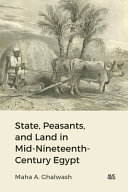Product desciption
State Peasants And Land In Midnineteenthcentury Egypt Maha Ghalwash by Maha Ghalwash 9781649032775, 9781649032782, 9781649032799, 1649032773, 1649032781, 164903279X instant download after payment.
An alternative reading of the relationship between the state and smallholder peasants in mid-nineteenth-century Egypt This book examines the rural history of Egypt during the middle years of the nineteenth century, a period that is often glossed over, or altogether forgotten. Drawing on a wide array of archival sources, some only rarely utilized by other scholars, it argues that state policy targeting the peasant land tenure regime was informed by the dual economic principles of the Ottoman, or traditional, philosophy of statecraft, and that the workings of the relevant regulations did not produce extensive peasant land loss and impoverishment. Maha Ghalwash presents a rich, detailed analysis of such crucial issues as land legislation, tax impositions, the system of tax collection, modes of land acquisition, large-scale peasant abandonment of land, the emergence of surplus lands, the formation of large, privileged estates, distribution of village land, female land inheritance, and the nature of peasants' political activity. In investigating these issues, she highlights peasant voices, experiences, and agential power. Traditional interpretations of the rural history of nineteenth-century Egypt generally specify an avaricious state, so indifferent to peasant well-being that it consistently developed harsh policies that led to unremitting, extensive peasant impoverishment. Through an examination of the relationship between the absolutist state and the majority of its subject population, the peasant smallholders, during 1848-63, this study shows that these ideas do not hold for the mid-century period. State, Peasants, and Land in Mid-Nineteenth-Century Egypt will be of interest to students of Middle East history, especially Egyptian rural history, as well as those of peasant studies, subaltern studies, gender studies, and Ottoman rural history.


